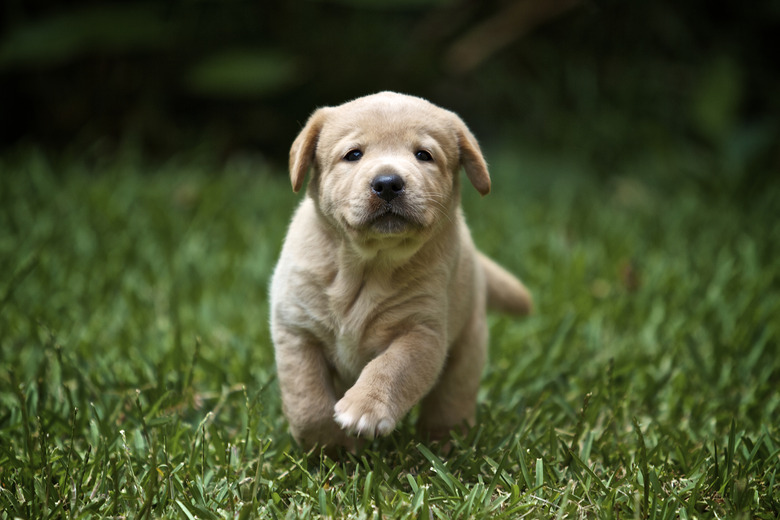Puppy Shots & Diarrhea
When you're taking your puppy to get her vaccinations, the last thing you want is to think that the vaccinations may have actually made her sick. If your dog or puppy has diarrhea after vaccinations, be assured that it's fairly common. Side effects of puppy vaccines are common for the first 48 hours or so, but if you see your puppy sick after shots for longer than that or if it seems serious, get your vet involved.
Puppy sick after shots?
Puppy sick after shots?
After your puppy's vaccination, VCA Animal Hospitals says it is normal for your puppy to feel a little tired. You may even notice him feeling lethargic, with some swelling and soreness at the vaccination injection site. Normal reactions to the vaccine also include not having an appetite and sneezing or coughing.
Moderate reactions that may make your puppy sick after shots include difficulty breathing, such as heaving, or a lethargy that seems more severe, such as in a way that prevents your puppy from walking. If your dog has diarrhea after vaccinations along with any of these severe symptoms, seek urgent medical attention for your puppy:
- Puppy diarrhea after vaccination is severe and constant
- Severe and constant vomiting
- Bumpy or itchy skin
- Swelling around the eyes, face, or neck
- Difficulty breathing and eventual collapsing
Vaccines for puppies
Vaccines for puppies
Puppies need vaccinations to stay healthy and avoid serious disease. Most of the time, vaccinations prevent disease without any serious issues. Even older dogs can experience side effects such as diarrhea after a vaccination, but because a puppy's body is so much smaller, the side effects can be more serious, can last longer, and can be more noticeable. Diarrhea in puppies is a serious matter because it can cause dehydration if it is left untreated. Call your vet if your puppy has a large amount of watery stool lasting more than a few hours.
According to VCA Animal Hospitals, some infections are more common in some areas than others, so the vaccines that your vet wants to give your puppy may vary slightly from place to place. The range of vaccines available includes rabies, distemper, adenovirus (infectious canine hepatitis), parvovirus, leptospirosis, parainfluenza, coronavirus, Bordetella bronchiseptica, Lyme disease, and canine influenza.
Sometimes, these vaccines are available in combinations, which reduces the number of shots your puppy has to endure. Sometimes, these vaccines are given in the nose or just under the skin. Both are such sensitive areas that it is not uncommon to hear a puppy yelping after vaccination, but don't worry. The feeling from the little pinch or prick goes away quickly.
DHPP vaccine side effects
DHPP vaccine side effects
The DHPP vaccine is a combination vaccine that is given at 10 to 12 weeks of age, according to the American Kennel Club. DHPP stands for distemper, adenovirus (also called hepatitis), parainfluenza, and parvovirus. The DHPP vaccine is effective for three years, according to the Drake Center for Veterinary Care.
The benefits of vaccinations far outweigh any risks, especially when you consider that a disease like canine distemper is so severe and so contagious that some dogs don't survive. There is no cure for distemper, and this disease can affect other animals, including raccoons and skunks. When considering DHPP vaccine side effects, diarrhea is at the top of the list. Other potential symptoms are:
- Fever
- Sluggishness
- Loss of appetite
- Facial or paw swelling and/or hives
- Vomiting
- Diarrhea
- Pain or swelling around the injection site
- Collapse, difficulty breathing, and seizures (anaphylactic shock)
Since side effects do happen and serious complications need to be avoided, have your puppy vaccinated at a time when you can monitor her afterward for at least a couple of days. If any of these symptoms develop in your puppy after vaccinations, contact your veterinarian immediately.
Always check with your veterinarian before changing your pet's diet, medication, or physical activity routines. This information is not a substitute for a vet's opinion.
